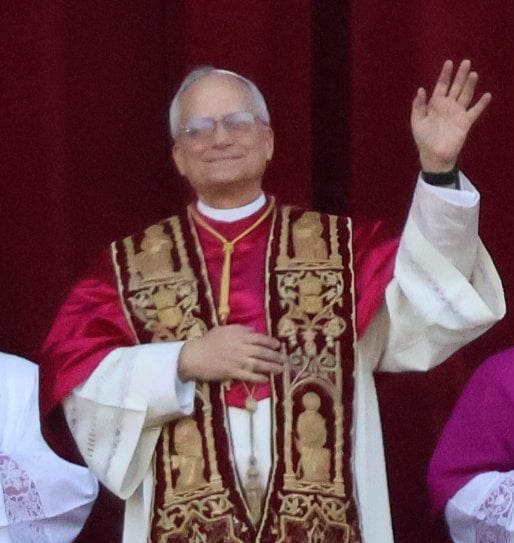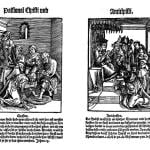The conclave of cardinals elected a new pope to rule the Roman Catholic Church, and to most observers’ surprise, they picked an American, Robert Prevost, who took the name of Leo XIV.
Prevost is from Chicago, went to school at Villanova just outside Philadelphia, and began his priesthood here in St. Louis. He spent most of his ministry as a missionary in South America and became a dual citizen of Peru. Most recently he has served as the head of the Vatican office in charge of the appointment of bishops.
Probably one of the few things the 69-year-old pontiff has in common with Martin Luther is that they were both members of the Augustinian order. Leo is the first Augustinian to be pope, just as Francis was the first Jesuit.
The world is wondering, what kind of Pope will he be? A liberal like Francis or a conservative like Benedict? It isn’t clear what faction he belongs to, and such neat binaries often don’t apply to Catholic leaders. He has been described as being progressive when it comes to social justice issues, while also supporting the church’s traditional moral teachings. That would describe most Catholic clerics.
One clue as to what kind of pope someone newly-elected to that office might be is in the name that he chooses. The scholarly conservative theologian Cardinal Ratzinger chose to be “Pope Benedict,” signaling his desire to be like St. Benedict in Christianizing Western civilization. Cardinal Bergoglio chose to be “Pope Francis,” signaling his desire to be like St. Francis in ministering to the poor and outcast.
The problem is, there are different Leo’s, and it isn’t clear which one Leo XIV wants to emulate.
There was the authoritarian Pope Leo I (reigning 440-461), of whom historian Lisa Diller says:
The first pope Leo (elected in 440) is credited with making the bishop of Rome into “the pope,” centralizing church authority. He placed a big emphasis on rooting out heresies such as Manicheanism and Pelagianism, calling on church members to denounce any clergy who wandered from orthodoxy, with heretics being tried and possibly tortured till they confessed.
And there was the progressive Leo XIII, the “workers’ pope” (reigning 1878-1903)described in his Wikipedia article this way:
He is well known for his intellectualism and his attempts to define the position of the Catholic Church with regard to modern thinking. In his famous 1891 encyclical Rerum novarum, Pope Leo outlined the rights of workers to a fair wage, safe working conditions, and the formation of trade unions, while affirming the rights to property and free enterprise, opposing both socialism and laissez-faire capitalism. With that encyclical, he became popularly called the “Social Pope” and the “Pope of the Workers”, also having created the foundations for modern thinking in the social doctrines of the Catholic Church, influencing his successors.
As is done today, people are trying to track down his online trail, looking for things he has said during his lifetime that can possibly discredit him.
Like most bishops, especially those who have worked in Latin America, he has criticized Trump and Vance on immigration, stoking indignation on the right.
He has also criticized the LGBTQ movement, stoking indignation on the left. The left-leaning UK periodical The Guardian published an article entitled Unearthed comments from new pope alarm LGBTQ+ Catholics. Here are some of the “alarming” things he said:
In a 2012 address to the world synod of bishops, the man who now leads the church said that “Western mass media is extraordinarily effective in fostering within the general public enormous sympathy for beliefs and practices that are at odds with the Gospel – for example abortion, homosexual lifestyle, euthanasia”.
In the remarks, of which he also read portions for a video produced by the Catholic News Service, a news agency owned by the United States Conference of Catholic Bishops, the cleric blamed mass media for fostering so much “sympathy for anti-Christian lifestyles choices” that “when people hear the Christian message it often inevitably seems ideological and emotionally cruel”.
“Catholic pastors who preach against the legalization of abortion or the redefinition of marriage are portrayed as being ideologically driven, severe and uncaring,” Prevost added.
He went on to complain that “alternative families comprised of same-sex partners and their adopted children are so benignly and sympathetically portrayed in television programs and cinema today”. . . .
The cleric also called for a “new evangelization to counter these mass media-produced distortions of religious and ethical reality”.
My impression is that he is exactly right, not only about the moral issues but also about how the media manipulates the public to disregard them. This strikes me as someone who understands the issues and is savvy about what Christians are up against.
In his first speech as Pope and in his first sermon at mass, he talked about the need for faith in Christ and the need for a missionary agenda. From his homily:
Even today, there are many settings in which the Christian faith is considered absurd, meant for the weak and unintelligent. Settings where other securities are preferred, like technology, money, success, power, or pleasure.
These are contexts where it is not easy to preach the Gospel and bear witness to its truth, where believers are mocked, opposed, despised or at best tolerated and pitied. Yet, precisely for this reason, they are the places where our missionary outreach is desperately needed. A lack of faith is often tragically accompanied by the loss of meaning in life, the neglect of mercy, appalling violations of human dignity, the crisis of the family and so many other wounds that afflict our society.
Today, too, there are many settings in which Jesus, although appreciated as a man, is reduced to a kind of charismatic leader or superman. This is true not only among non-believers but also among many baptized Christians, who thus end up living, at this level, in a state of practical atheism.
This is the world that has been entrusted to us, a world in which, as Pope Francis taught us so many times, we are called to bear witness to our joyful faith in Jesus the Saviour. Therefore, it is essential that we too repeat, with Peter: “You are the Christ, the Son of the living God” (Mt 16:16).
It is essential to do this, first of all, in our personal relationship with the Lord, in our commitment to a daily journey of conversion. Then, to do so as a Church, experiencing together our fidelity to the Lord and bringing the Good News to all.
We’ll see what this means in practice. I suspect Pope Leo XIV will project the kindness of Pope Francis, but be much more careful in what he says. And he will have more of the theological rigor of Pope Benedict XVI, without being quite the formidable theologian that he was. He will be a good administrator, which is what the Catholic church desperately needs right now, and will work to hold things together. I suspect he will OK the Latin Mass, reversing what Francis did to restrict it, but he will continue some of his predecessor’s reforms, though not to the point of adjusting church teaching about sexual morality, female priests, or life issues.
Lest you think I’m being too generous to an antichrist, read tomorrow’s post, in which we will discuss what Luther said about the papacy, both as antichrist and in a sense in which he could sort of accept the bishop of Rome.
Photo: Pope Leo XIV by Edgar Beltrán / The Pillar – https://x.com/edgarjbb_/status/1920590815472108021, CC BY-SA 4.0, https://commons.wikimedia.org/w/index.php?curid=164970023














